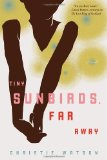Summary | Excerpt | Reading Guide | Reviews | Beyond the Book | Readalikes | Genres & Themes | Author Bio

One
Father was a loud man. His voice entered a room before he did. From my bedroom window I could hear him sitting in the wide gardens, or walking to the car parking area filled with Mercedes, or standing by the security guard’s office, or the gate in front.
The gate had different signs stuck on it every week:
No Hawkers
Hawkers Only Permitted if Called by Residents
No Barbecues in the Gardens
No Overnight Guests: Remember, Friends Can Be Armed Robbers Too
And once, until Mama saw the sign and had Father remove it, after he had laughed so loudly that the walls shook:
No Sexual Activity or Defecating in the Gardens.
We lived on Allen Avenue in Ikeja, on the fourth floor of a gated apartment block called ‘Better Life Executive Homes’. I loved watching the street from my window, the traders outside walking up and down the avenue, with brightly coloured buckets and baskets and trays balanced on their heads. They were always shouting: ‘Chin-chin, chin-chin’, or ‘Flip-flops’, or ‘Batteries’, or ‘Schnapps’. Every day, no matter how many days I had looked out of the window during my twelve years, there was something being sold that I had not seen before: shoe-horns, St Michael’s underwear, imported Hello! magazines. I loved watching the women huddled underneath umbrellas, their legs poking out of the bottoms like thick yams. Or the men with necks covered in yellow gold, sitting on the bonnets of their BMWs, and the women wearing Western-style clothes hovering around them like stars around the moon. The women visited the boutique dress shops, and all the day the men would go in and out of the bars and Chinese restaurants, one hand always in their pocket ready to pull out some more naira.
Occasionally Mama rushed in and pushed me off the window seat, opening the window wide to let out the cold air and let in the heat, and the smells of the nearby market, of sewerage from the open gutters, the fresh fish, raw meat, akara, puff-puff, and suya. The smells made me feel sick and hungry at the same time. ‘Don’t look at those men,’ Mama would say. ‘I wish they would go to some other place to spend their money.’
But there was no other place. Allen Avenue was the richest road in Ikeja, with the most shops. If you had money to spend, Allen Avenue was where you spent it. And if you were even richer, like us, then you lived there. On Allen Avenue every house or apartment had a generator. The hum they made was constant, day and night. Roads surrounded us that had no electricity at all, where people went to bed as soon as night fell and, according to my brother Ezikiel, produced too many babies. But Allen Avenue was brightly lit. People left their televisions and radios on loud all night, to show how much money they could afford to waste.
‘Hey, hey you! I need soaps.’
‘Best quality soap. Anti-germ. Very fine, good for skin. Will smooth you and sooth you, Mama. Very famous soap. Imported from US.’
Mama waved her hand up and down as the tall woman with the blue and white plastic bowl full of soaps walked slowly towards the security gate. She did not rush. Nobody did. Even when the other hawkers realised that Mama was buying soap. That she had money to spend. They looked up at the window and shouted out the contents of their bowls or baskets or trays: Oranges, Pure Water, Bush Meat, Alarm Clock, Petticoats, Gucci Handbags.
But from where I was sitting, I did not need them to shout.
I could see everything.
Father worked as an accountant for an office full of government ministers in central Lagos, and had to leave the apartment very early in the morning to miss the worst of the go-slow. Ezikiel woke up extra early to see Father before he left for work, even though he was fourteen years old and not a morning person. He liked to sit on Father’s side of his bed next to his neatly laid out work clothes, and watch him dress, pass him his tie, cufflinks, and wristwatch. Mama would tut loudly into her pillow before swinging her long legs out of the bed as Father whistled and teased her. ‘It is like sleeping next to a handful of needles,’ he would say, ‘sharp and bony, poking me through the night.’ Mama would tut even louder, and sometimes suck her teeth. She too was not a morning person.
Excerpted from Tiny Sunbirds, Far Away by Christie Watson. Copyright © 2011 by Christie Watson. Excerpted by permission of Other Press. All rights reserved. No part of this excerpt may be reproduced or reprinted without permission in writing from the publisher.
Your guide toexceptional books
BookBrowse seeks out and recommends the best in contemporary fiction and nonfiction—books that not only engage and entertain but also deepen our understanding of ourselves and the world around us.